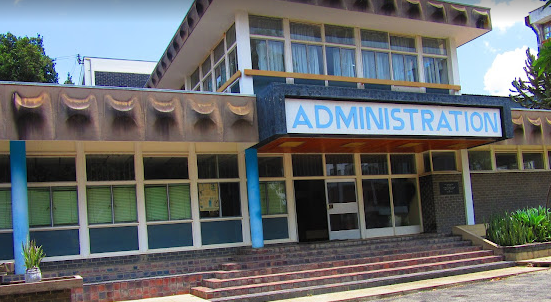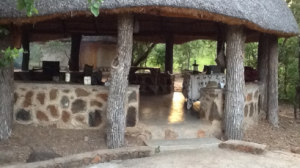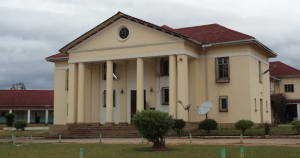The Essentials
Type of Institution: University
Fees per Semester: US$500.00 to US$1 400.00
Address: Cold Storage Company (CSC) Complex, Plot 15, Longlands Road, Marondera, Zimbabwe
Phone Number: +263 78 645 8526
Chancellor: E.D Mnangagwa
Vice Chancellor: Prof. Justice Nyamangara
Number of students: 1000+
Website: https://muast.ac.zw/
Email: admin@muast.ac.zw
Table Of Contents
- Overview
- Contact Details
- Address
- Location
- School Fees
- Courses & Programs
- Vacancies and Entry Requirements
- Logo
- Notable Alumni
- Pros and Cons
- Author’s Review
Overview
Marondera University of Agricultural Sciences and Technology (MUAST) is a specialized public university in Zimbabwe that focuses on agricultural sciences and technology.
Background
Established: MUAST was officially established in 2015 through an Act of Parliament, making it one of the newer universities in Zimbabwe.
Location: The university is situated in Marondera, a town in Mashonaland East Province, approximately 72 kilometers east of Harare. The location is ideal for agricultural studies due to its proximity to farming areas.
Academic Focus
Specialization: MUAST is dedicated to advancing agricultural sciences and technology, emphasizing the development of skills and knowledge essential for Zimbabwe’s agricultural sector. The university offers undergraduate and postgraduate programs in various fields related to agriculture.
Faculties: The university’s faculties include:
Faculty of Agricultural Sciences
Faculty of Agribusiness and Entrepreneurship
Faculty of Engineering and Applied Sciences
Research and Innovation
Research Centers: The university is involved in agricultural research, particularly in areas that are crucial for Zimbabwe’s food security and agricultural sustainability. Research focuses on improving crop yields, livestock production, and developing new farming technologies.
Collaborations: MUAST collaborates with local and international institutions, government agencies, and the private sector to enhance research outcomes and contribute to agricultural development.
Community Engagement
Extension Services: MUAST provides extension services to local farmers, offering them the latest agricultural practices and technologies. This helps in bridging the gap between academic research and practical farming applications.
Workshops and Training: The university regularly organizes workshops, training sessions, and seminars for farmers, students, and professionals in the agricultural sector.
Facilities
Campus: MUAST’s campus is equipped with modern facilities including laboratories, research farms, and greenhouses to support both teaching and research.
Library and Resources: The university provides access to a well-stocked library, digital resources, and academic support services to enhance student learning.
Vision and Mission
Vision: To be a leading center of excellence in agricultural sciences and technology, contributing to the sustainable development of Zimbabwe and the region.
Mission: MUAST is committed to producing competent graduates who can contribute to the transformation of the agricultural sector through innovative research, teaching, and community service.
Future Prospects
As a growing institution, MUAST is continually expanding its academic programs, research initiatives, and infrastructure to meet the evolving needs of the agricultural sector in Zimbabwe and beyond.
Marondera University of Agricultural Sciences and Technology Contact Details
You can contact Marondera University of Agricultural Sciences and Technology via their landline, email or you can visit their website for further contact details.
Phone Number: +263 78 645 8526
Website: https://muast.ac.zw/
Email: admin@muast.ac.zw
Marondera University of Agricultural Sciences and Technology Address
Cold Storage Company (CSC) Complex, Plot 15, Longlands Road, Marondera, Zimbabwe
Marondera University of Agricultural Sciences and Technology Location
Marondera University of Agricultural Sciences and Technology is situated in Marondera, a town in Mashonaland East Province, approximately 72 kilometers east of Harare.
Marondera University of Agricultural Sciences and Technology Fees
Marondera University of Agricultural Sciences and Technology (MUAST) ‘s fees is currently standing at US$500.00 to US$1 400.00 per semester depending on the program you are studying and the level of degree you are studying. Please contact the institution or visit them to get the latest fees structure as it can change at any term or semester.
Marondera University of Agricultural Sciences and Technology Courses & Programs
Marondera University of Agricultural Sciences and Technology (MUAST) offers a range of undergraduate and postgraduate programs focused on agricultural sciences, agribusiness, and technology. Below is a list of some of the courses and programs offered:
Undergraduate Programs
Bachelor of Science in Agriculture
Crop Science
Animal Science
Horticulture
Bachelor of Science in Agricultural Engineering
Agricultural Mechanization
Irrigation and Water Resources Engineering
Bachelor of Science in Agribusiness and Entrepreneurship
Agribusiness Management
Agricultural Economics
Bachelor of Science in Agricultural Education and Extension
Bachelor of Science in Environmental Science
Environmental Management
Postgraduate Programs
Master of Science (MSc) Programs
MSc in Crop Science
MSc in Animal Science
MSc in Agricultural Economics
MSc in Agricultural Engineering
MSc in Horticulture
MSc in Plant Breeding
MSc in Soil Science
Master of Philosophy (MPhil) and Doctor of Philosophy (PhD) Programs
MPhil/PhD in Agricultural Sciences
MPhil/PhD in Agribusiness
MPhil/PhD in Environmental Science
Diploma Programs
Diploma in Agriculture
Diploma in Agribusiness
Short Courses and Certificates
MUAST offers various short courses and certificate programs aimed at providing practical skills in agriculture, farm management, and agricultural technology. These are often designed to meet the immediate needs of farmers and professionals in the sector.
Extension and Outreach Programs
MUAST also provides extension services, workshops, and training programs designed to update professionals and farmers on the latest developments in agricultural practices and technologies.
Marondera University of Agricultural Sciences and Technology Vacancies and Entry Requirements
Marondera University of Agricultural Sciences and Technology (MUAST) has specific entry requirements for its various programs, as well as vacancies.
Entry Requirements
Undergraduate Programs
Bachelor of Science in Agriculture (Crop Science, Animal Science, Horticulture)
Ordinary Level: At least 5 passes including English Language, Mathematics, and a Science subject.
Advanced Level: At least 2 A-Level passes in Biology, Agriculture, Chemistry, Mathematics, Physics, or any relevant science subjects.
Bachelor of Science in Agricultural Engineering
Ordinary Level: At least 5 passes including English Language, Mathematics, and a Science subject.
Advanced Level: At least 2 A-Level passes in Mathematics, Physics, Chemistry, or any other relevant science subjects.
Bachelor of Science in Agribusiness and Entrepreneurship
Ordinary Level: At least 5 passes including English Language and Mathematics.
Advanced Level: At least 2 A-Level passes in Commercials (Economics, Business Studies, Accounting) or relevant science subjects (Agriculture, Biology).
Bachelor of Science in Environmental Science
Ordinary Level: At least 5 passes including English Language, Mathematics, and a Science subject.
Advanced Level: At least 2 A-Level passes in Environmental Science, Geography, Biology, or any other relevant science subjects.
Bachelor of Science in Agricultural Education and Extension
Ordinary Level: At least 5 passes including English Language and Mathematics.
Advanced Level: At least 2 A-Level passes in relevant science subjects, such as Agriculture, Biology, or Geography.
Postgraduate Programs
Master’s Programs
Bachelor’s Degree: A relevant undergraduate degree with at least a 2.2 class or its equivalent from a recognized institution.
Work Experience: Some programs may require relevant work experience in the field.
MPhil and PhD Programs
Master’s Degree: A relevant master’s degree from a recognized institution.
Research Proposal: A detailed research proposal is usually required for admission.
Application Process
Applications are typically submitted online through the university’s admissions portal, with required documents such as academic transcripts, identification, and certificates.
Marondera University of Agricultural Sciences and Technology Logo
Below is the logo of Marondera University of Agricultural Sciences and Technology with excellent quality and it is available to download in PNG (transparent file) JPEG and PDF.
Marondera University of Agricultural Sciences and Technology Pros and Cons
Pros
Specialized Focus: MUAST has a strong emphasis on agricultural sciences and technology, providing specialized education and research opportunities in fields crucial to Zimbabwe’s agricultural sector.
Practical Experience: The university offers hands-on training through its research farms, laboratories, and fieldwork, which helps students gain practical experience relevant to their future careers.
Community Engagement: MUAST is involved in community outreach and extension services, providing valuable support and resources to local farmers and communities.
Research Opportunities: The university supports research in agricultural innovations and practices, contributing to advancements in crop production, livestock management, and sustainable agriculture.
Growing Infrastructure: As a relatively new institution, MUAST is expanding its facilities and academic programs, which can lead to modern and updated learning environments.
Collaborations and Partnerships: MUAST collaborates with local and international institutions, enhancing its research capabilities and providing students with broader learning and networking opportunities.
Cons
Limited Resources: Being a relatively new institution, MUAST may face constraints in terms of financial resources and infrastructure development compared to older, more established universities.
Perception Issues: The university might face challenges related to its perceived prestige and reputation, which could affect its appeal to prospective students and partners.
Program Scope: While specialized in agriculture, the range of programs offered may be limited compared to larger institutions with a broader academic focus.
Geographical Location: The university’s location in Marondera might limit its accessibility for students from other regions, potentially affecting enrollment and diversity.
Funding and Scholarships: Financial aid and scholarship opportunities might be limited, which can impact students from disadvantaged backgrounds seeking to pursue their studies.
Developmental Challenges: As a growing institution, MUAST may encounter challenges related to scaling its programs, expanding its research activities, and enhancing its overall academic environment.
Author's Review
Marondera University of Agricultural Sciences and Technology (MUAST) plays a crucial role in advancing agricultural education and research in Zimbabwe. Its specialized focus on agricultural sciences and technology equips students with practical skills and knowledge essential for addressing the challenges facing the agricultural sector.
The university’s commitment to hands-on training, community engagement, and research demonstrates its dedication to driving agricultural innovation and supporting local farmers.
Despite its strengths, MUAST faces challenges common to newer institutions, such as limited resources, perception issues, and a relatively narrow program scope. These factors may affect its ability to expand and enhance its offerings, as well as its overall reputation.
However, as MUAST continues to develop its infrastructure and academic programs, it has the potential to build on its existing strengths and address these challenges effectively.
In summary, Marondera University of Agricultural Sciences and Technology is a valuable institution contributing significantly to the field of agriculture. Its focus on practical experience and community involvement highlights its commitment to fostering sustainable agricultural practices and supporting regional development.
With ongoing efforts to overcome its challenges and capitalize on its strengths, MUAST is well-positioned to make a lasting impact in agricultural education and research.




